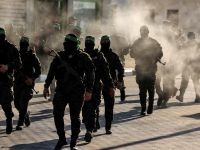Three men accused of carrying out the 1998 killings of leading Iranian dissidents were ordered held Saturday as their controversial trial began behind closed doors.
The defendants, who are among 17 people on trial for the killings which authorities have blamed on "rogue" intelligence agents, were not named by the court in its statement after the session, carried by the official IRNA news agency.
The court, citing "reasons of national security," also confirmed the whole of the trial would be held behind closed doors, dashing the hopes of pro-reform politicians and others that the public would be allowed to attend.
All of the defendants had been free before the start of the trial, which comes amid a swirl of controversy, including allegations that top officials in the regime were involved in the murders.
The families of the five victims, reportedly frustrated by the secrecy surrounding the two-year investigation, are boycotting the trial in protest and last week announced they had fired their lawyers.
In its statement, the Tehran military court noted their absence but said this did not signify that their complaints had been retracted and stressed that the trial would go ahead as planned.
Secular nationalist leader Dariush Foruhar and his wife Parvaneh were found stabbed to death in their apartment in November 1998, followed within weeks by writers Majid Sharif, Mohammad Mokhtari and Mohammad Pouyandeh.
The three outspoken writers were well-known for their calls for greater freedom of expression in Islamic Iran, and the string of murders sparked widespread outrage and heightened political tension in the country.
Authorities in January 1999 announced that a network of "rogue" secret agents had carried out the murders but had done so without the knowledge of their superiors in the intelligence ministry.
The controversy deepened last June when the man named as the mastermind behind the assassinations, Said Emami, was reported to have committed suicide in prison by drinking a bottle of hair remover.
He is being tried posthumously by the court as an 18th suspect.
The killings led reformist President Mohammad Khatami to commission his own investigation, amid efforts by his administration to revamp the conservative-dominated court system.
Court authorities banned any revelations about the case ahead of the trial and last week arrested a lawyer for two of the victims' families after he claimed that the murders had been ordered by a religious decree.
More than 130 intellectuals and writers called Saturday for the quick release of the lawyer, Nasser Zarafshan, in a letter to judiciary chief Ayatollah Mahmud Hashemi-Shahrudi, a copy of which was obtained by AFP.
Iran's largest pro-reform party, led by the president's brother, Mohammad-Reza, has called the trial a "big test" for the judiciary, which has repeatedly hampered Khatami's efforts at legal and political reform.
Pro-reform journalist Akbar Ganji, now in jail himself, alleged that former intelligence chief Ali Fallahian, a close ally of former president Akbar Hashemi Rafsanjani, was the key figure behind the assassinations.
Fallahian, who was no longer head of the powerful secret police at the time of the killings, has denied the allegations.
The court said the next session of the trial will be held on Monday -- TEHRAN (AFP)
© 2000 Al Bawaba (www.albawaba.com)







